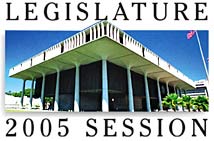Legislators promote
voting by mail only
The next time you vote, forget about going to your nearest polling place. The mailbox could soon become your ballot box.
Key legislators in the House and Senate are working on legislation to change all or part of the state and county elections so ballots must be submitted by mail.
|
|
"I think this idea has a good chance. There are a lot of supporters," Hanabusa (D, Nanakuli-Makua) said.
The system would be patterned after the successful Oregon voting system that did away with walk-in voting.
In Oregon all registered voters are mailed a ballot. Voters make their choices and either mail the ballot in a special envelope or carry it into the elections office.
The system both saves money and encourages voting, said Oregon Secretary of State Bill Bradbury in an interview with the Star-Bulletin.
"The last presidential election was a slam dunk for vote by mail," said Bradbury, a 14-year veteran of the Oregon Legislature.
Oregon reported an 86.5 percent turnout of registered voters in last year's general election, with a 71 percent turnout for those eligible to vote.
In comparison, Hawaii had the lowest voter turnout in the nation, according to the Center for the Study of the American Electorate. Only 48.9 percent of the state's eligible voters went to the polls, although 66.7 percent of those registered to vote did so.
Bradbury noted that besides encouraging more people to vote, voting by mail is less expensive because the state does not have to staff polling places.
"We estimate that voting by mail is significantly less expensive. We saved a couple of million dollars in administration because we didn't have to maintain polling places or pay election workers," Bradbury said.
Voters in Oregon approved vote-by-mail in 1998 by 70 percent. Bradbury, a former Democratic Senate president, said the program is more popular now.
Oregon state starts counting the mailed-in ballots on election day. The first results are reported around 8:30 p.m., Bradbury said. Usually the unofficial final printout is issued around midnight, he said. Voters have a two-week window to send their ballots back to the state.
In Hawaii, voters can request an absentee ballot by mail, which can then be returned by mail. A recently approved state law calls for unscheduled elections, such as to fill U.S. House vacancies, to be held by mail.
Dwayne Yoshina, state election officer, said his office has tried unsuccessfully for several years to interest the Legislature in a vote-by-mail program.
"I think it is something we should look at. There are some pluses -- we are having a hard time recruiting poll workers," Yoshina said.
But he doubted that the state would see much of a reduction in election costs, because the costs to operate polling places would be replaced by increased postage charges.
Hanabusa, however, said she could see the benefits of the program.
"This will make a difference, and this could be a way to encourage participation," Hanabusa said.
[News] [Business] [Features] [Sports] [Editorial] [Do It Electric!]
[Classified Ads] [Search] [Subscribe] [Info] [Letter to Editor]
[Feedback]

